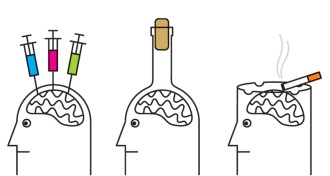Psychology
-
 Psychology
PsychologyWalking in sync makes enemies seem less scary
Men who walk in sync may begin to think of their enemies as weaker and smaller, a new study suggests.
-
 Psychology
PsychologyHypothesis on evolution of PMS attracts hostility
A new hypothesis states that PMS is evolutionarily useful for making women leave an infertile partnership. But other scientists question whether the hypothesis is reasonable or, in fact, even necessary.
-

-
 Psychology
PsychologyBilingual homes may give babies a learning lift
Hearing two languages during the first six months of life linked to an early mental advantage.
By Bruce Bower -
 Psychology
PsychologyAddiction showcases the brain’s flexibility
People with substance abuse disorders are not just chasing a high. Their brains are adapting to the presence of drug, evidence of humans’ impressive neural plasticity.
-
 Psychology
PsychologyGoalkeepers deceive themselves when facing penalty kicks
Soccer’s goalies fall victim to a logical fallacy during the sport’s most high-pressure situation, seeing trends where none exists.
By Nsikan Akpan -
 Tech
TechSmall lies in social networks may keep society running
Lying in social networks could have adverse, as well as beneficial, effects depending on the severity of the deception.
-
 Psychology
PsychologySchadenfreude starts young
Children as young as 2 years old feel joy at another’s misfortune, new research suggests, showing jealousy’s deep roots.
-
 Neuroscience
NeuroscienceFor rats, a break from stress isn’t worth the relief
An unplanned vacation from stress might seem like a good idea, but a new study in rats shows that unpredictable escapes from pressure produce more strain on the first day back.
-
 Psychology
PsychologyTo do your best, find a rival
There are rivals in every walk of life. A new study shows that for runners, a rival might help them do their best.
-
 Quantum Physics
Quantum PhysicsQuantum math makes human irrationality more sensible
Vagaries of human decision making make sense if quantum math describes the way the brain works.
-
 Science & Society
Science & SocietyMain result of Facebook emotion study: less trust in Facebook
Facebook’s controversial manipulation of emotional posts raises key questions about how to study online behavior.
By Bruce Bower